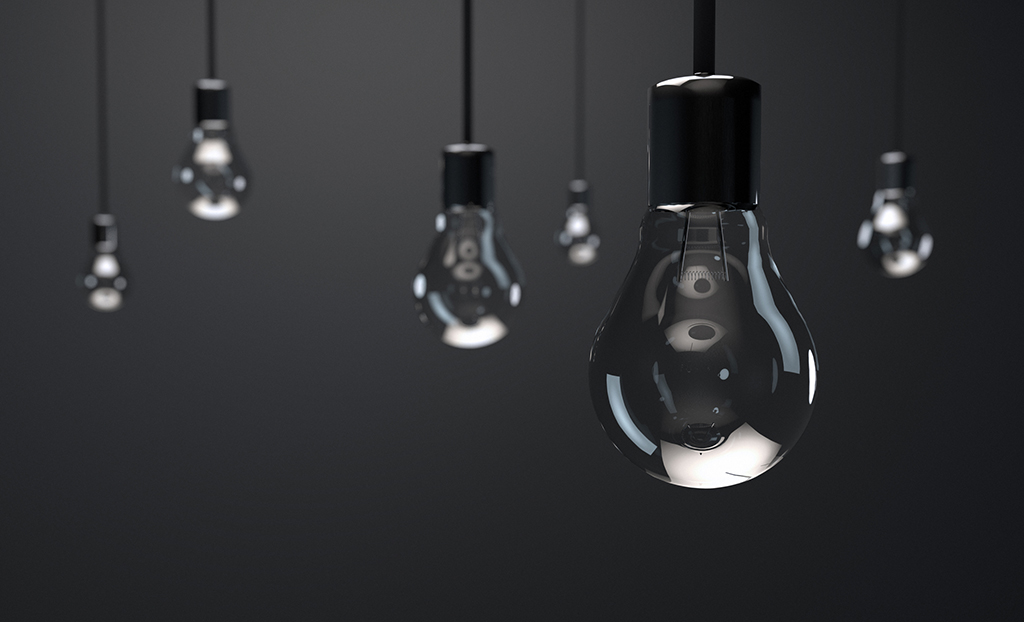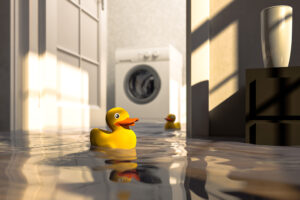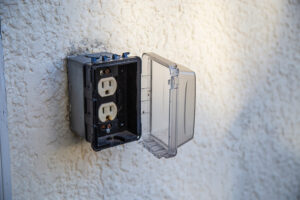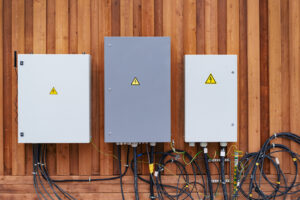
Why Did My Lights Go Out Suddenly? | An Expert Electrician Explains
Picture this: You are comfortably seated on the couch, perhaps watching your favorite TV program or reading, when your whole house is suddenly plunged into darkness. Frightening, right? It can be even more baffling if your lights go out, but your other outlets or power points are functioning.
There could be many things causing this, but chances are they aren’t ghosts. This blog will help you learn the likely culprits behind this kind of electrical issue and how you can go about it. Please, keep reading.
Power Outages
Sometimes, your neighborhood, or even the entire city or region, may experience a massive power outage due to inclement weather conditions such as heavy thunderstorms, lightning, ice storms, or high winds.
These natural occurrences can down power lines and cause power conductor faults. In some instances, when this happens, you may notice your lights go off momentarily as the breaker at the power company clears the fault and recloses.
You can also experience power outages in your home if the main electrical grid is undergoing maintenance. In addition, distribution failures can cause the electricity company in your area to shut down power until the issue is fixed.
Short Circuits
More often, power failures are typically confined to the home. An electrical short will mostly be the issue. A short circuit happens when the electrical current takes an unintended, shorter route instead of following its circuit. If there’s a short, your circuit breakers and fuses will pop almost immediately.
This can be pretty dangerous for your safety and that of your family. You should contact a licensed electrician to come in and diagnose the problem immediately before more damage occurs to your electrical system or even a fire breaks out.
Usually, the culprit is a blown fuse or tripped breaker due to excessive current flowing through the wires. To prevent the wires from overheating and the inherent fire risk, the circuit breaker or fuse cuts off the current automatically. Hence, the lights go off.
Overloaded Circuit
Circuit overload can happen due to plugging many appliances simultaneously into a single outlet that the circuit can handle. Consequently, the breaker trips and the power goes out. Therefore, avoid using too many household appliances simultaneously on one circuit to prevent such outages.
When a circuit breaker trips, the switch-shaped button is pushed up, down, right, or left, depending on how the installer positioned it. And even if you reset it, the circuit may break again shortly afterward if the initial cause of the overloaded circuit isn’t rectified. If you notice this, call a qualified electrical company hastily to have the problem fixed.
Multitasking is good, but it’s best not to do the ironing until you’re done with the toaster. Suppose you have multiple high-voltage appliances controlled by one fuse or breaker in your home. In that case, you may want a professional electrician to move one or more appliances to another box or circuit breaker.
Please learn the breakers in your home and how they function to help avoid overloading your electrical system. Find out which outlets are wired to a specific outlet so you don’t connect all your heavy-powered appliances and electronics to a single circuit.
Typically, large appliances, including dryers and kitchen ranges, are rigged to large-sized breakers of 220 V, which you can quickly distinguish from the ordinary 110-volt breakers for outlets and lights.
Electrical Panel Damage
A damaged service panel may lead to electrical issues that can cause momentary power interruptions in your home. Like any other equipment, your electrical panel is subject to malfunction at any time. Perhaps, your fuse or circuit breaker may need replacing.
Maybe water might have slipped into the panel, impairing it. Whenever your lights go out quickly, this could be the issue. It may be a relatively easy fix but will often require the expertise of a trained electrician.
Avid DIY-ers be warned that working with electricity is inherently hazardous. Plus, you don’t want to cause more damage to your panel. So, always hire a trained electrical service pro.
Bad Breaker Switch
Suppose you’ve checked your main breaker, and it’s all fine. But the lights keep going off and coming back right on within seconds. In that case, a bad breaker switch is likely the problem. Even if your circuit breaker works fine, a broken switch will cause brief power outages in your home.
With bad breaker switches, you may experience the lights go off in one room. The one controlled by that circuit breaker, or even the entire house if you use an old breaker. Ideally, if that circuit breaker has served you more than 30 years, replacing the entire unit would be in your best interest.
Issues with Dimmer Switches
Have you installed dimmer switches recently in your home? They may also be the reason why your lights are going off. This can be so if they’ve developed technical issues that may require repair or replacement.
The amount of electricity drawn from each light fixture and compatibility with your lights will affect how your dimmer switches work.
Mister Sparky of Myrtle Beach: The Top Electrical and Lighting Company Near You
Have your lights gone off? Don’t fret. With Mister Sparky of Myrtle Beach, you’ve everything sorted.
Our ever-punctual electrical service team will ensure they resolve the issue faster so you can stay comfortable and safe in your home. If you have any questions about this topic, contact us online or via call.
To Summarize
Proper lighting in your home is essential. Having your lights go out at once can be exasperating. Some lights going off might indicate an issue with that particular lighting fixture or bulb. But all lights turning off unexpectedly could signify a serious problem with your electrical system. So you need to partner with an experienced electrician from Mister Sparky of Myrtle Beach who can help you solve potential issues promptly and safely.
See our most recent blog on this topic here.
Find out our service area here.
Photo By joshblake at istock
How An Emergency Electrician Can Save Your Home From Electrical Disasters
People often don’t think about their home’s electricity until a problem occurs. Electrical emergencies can happen anytime and can be dangerous and costly if not handled properly. That’s why it’s essential to have an emergency electrician’s contact information on hand. A trained professional has the experience and expertise to help solve various electrical problems.
When to Call for an Emergency Electrical Service
It’s dangerous if the electricity in your home doesn’t work well. Here are some situations that call for emergency electrical services:
Flooding
Leaks and flooding may prompt you to call a plumber, but you should also contact an emergency electrical provider. The water in your house may damage your electrical system, presenting a dangerous condition for you and anyone else in the home. Ensure that an electrical professional looks at the situation before the clean-up process.
Flickering Lights
Flickering lights indicate an electrical problem. If the lights flicker, especially when an appliance runs, it may indicate high demand in your electrical system. It would help if you had an electrician assess the problem and make some changes to your appliances. This may involve adding extra outlets or ensuring your appliance is on a different circuit.
Warm Switches
If you touch your switch or unused appliances and find that they are warm, there could be a problem with your electrical system. For your safety, ensure you contact an emergency electrical service provider.
Electrical Hum
Humming sounds from your electrical components may indicate an underlying problem with your electrical system. Humming may be caused by an improperly grounded, loose, or overloaded wire. These situations are fire hazards, and you must involve a professional electrician.
Shocks
Getting an electric shock from your switch should be treated as an emergency. Shocks may indicate incorrect, damaged, or old household wiring. You should call an emergency electrician to investigate the underlying issue and fix it immediately.
Overuse of Extension Cords
Requiring too many extension cords indicates that you don’t have enough power outlets in your home. The best solution would be the installation of more outlets to avoid overloading sockets.
Finding an Emergency Electrical Service Provider
Issues with electricity are sensitive and should be handled by qualified professionals. It would help if you found a qualified emergency electrician for quality, practical work. Here are considerations to make to choose the right company:
Prioritize Licensing and Certification
A good electrician should have accredited approvals from the relevant bodies to provide services. There are specific standards that certified electricians must adhere to that govern both commercial and domestic institutions. For an electrician to be certified, they must undergo some assessment process that involves equipment checks, site visits, documentation, and reviews. A certified electrician follows the rules set by their governing body, ensuring you get the best quality service.
Availability
Availability is crucial, especially when hiring an emergency electrician. Choose a company that offers flexible working hours during the day and at night. Ask companies about their schedules and pick the ones that offer flexibility.
Experience and Qualification
Experience determines whether an electrician can handle a job, regardless of complexity. Electricians have varying qualifications and specialize in different electrical works. Choose an electrician with the correct qualifications to ensure you receive the highest workmanship standard. Most issues are handled by electricians holding credits and experience. Mister Sparky of Myrtle Beach has various qualified and experienced professionals that can effectively handle your emergency electrical issues.
Quality of Equipment
The quality of equipment sets novices apart from experienced service providers. Good equipment usually reflects the worker’s quality and care about maintaining safety and work standards. Cutting-edge equipment means an electrician can perform tasks efficiently, offering good value for money. Mister Sparky of Myrtle Beach employees have access to high-quality equipment while performing their regular duties.
Proper Training
You must ensure that your chosen company has well-trained staff to tackle issues. Even when dealing with an individual contractor, asking about expertise and training certifications is essential. Other tasks, however, cannot be handled by individuals and may require a team. If an electrician is not adequately trained, they will likely make errors that may cause serious injury, property damage, or death. Without the proper training, their health and safety is at risk whenever they’re on their worksite. Mister Sparky of Myrtle Beach has properly trained electricians who can guarantee their safety and that of their clients.
Professionalism
The attitude of an electrician matters when they’re communicating with you. Inexperienced electricians commit to jobs and don’t show up on time. Professionals usually give constant updates and deliver quality work. An electrician should be passionate and proactive in asking questions and understanding the situation before they start handling it. If an electrician shows motivation and effort, that’s right for you. Electricians at Mister Sparky of Myrtle Beach show high professionalism when dealing with clients.
References from Past Clients
Competent professionals usually have previous clients to attest to their work. Past client reviews give you an idea about a company’s trustworthiness and quality of service. Most service providers have a review section on their websites that you can visit and look at the opinions of past clients. Positive reviews indicate that you can trust the company in question. Mister Sparky of Myrtle Beach has had numerous positive reviews from past clients commending its work.
Safety Measures
It would help if you determined whether your emergency electrical service provider abides by the safety standards. Safety regulations help to avoid accidents and costly expeditions. You should not compromise your safety to access cheaper services. They may end up costing you in the long run.
Customer Service
You should look for an electrician who values customer satisfaction. This is not just about doing the work correctly but ensuring the client is happy with the whole experience. Good customer service indicates that the electrician cares about the client’s money and their well-being. Finding a service provider that effectively communicates with you through the whole process is essential.
For emergency electrical repairs, our company, Mister Sparky of Myrtle Beach, is the company for you. We offer high-quality electrical services through professionals. Call us today to get access to top-notch services.
See our most recent blog on this topic here.
Photo By sitox at istock
Types Of Electrical Enclosures An Electrician Uses To Protect Your Electrical Components | Myrtle Beach, SC
When placed outdoors by an electrician, electrical and electronic components bear the full brunt of the environmental factors. Exposure to climatic elements can easily cause their degradation, resulting in connectivity issues and total system failure. Fortunately, you can today purchase an electrical enclosure to protect these sensitive electrical components. However, choosing the enclosure based on the dimensional requirements might prove a mistake. Below are things you should have in mind when choosing an electrical enclosure.
Why Use Electrical Enclosures?
You need to install electrical components on an enclosure for several reasons. To begin with, an electrical component enclosure protects delicate electrical components and wiring from harsh environmental elements. Doing this prolongs the equipment service life and reduces the risk of electrical hazards. These enclosures also provide a convenient way of mounting electrical components. This is particularly vital when limited space or components must be arranged in a particular manner.
An electrical enclosure also can help improve the aesthetics of an electrical installation. This is particularly important when the installation’s appearance is essential or in public areas. Electrical enclosure cabinets provide a protective element as they prevent unauthorized access to the components within. This is important in tamper- or theft-prone areas.
Electrical Enclosure Size
Electrical enclosures are of different sizes. This particularly depends on the specific requirements of your application. Hence, you should ensure that you consult with the electrician before you purchase an enclosure. They will advise on the size that best meets your needs.
Electrical Enclosure Material
Many electrical enclosure units use sheet metal such as stainless steel, aluminum, or carbon steel. Other materials, such as fiberglass or plastic, also can be used. However, what material makes the enclosure you’ll purchase will significantly be dictated by the environment where you’ll use the enclosure. Remember, the material making the enclosure directly affects its lifespan.
Electrical Enclosure Accessories
It is also possible to get electrical enclosure units that have several accessories. The common accessories in an electrical enclosure include mounting plates, DIN rails, and cable glands. The accessories help the electrician create a complete solution to house the electrical wiring and equipment.
Types of Electrical Enclosure
Different electrical enclosures are based on their material, function, mounting option, and features. Below are the most common electrical enclosures, their best use, and their features.
Wall-Mount Enclosures
Wall-mount electrical enclosures are the most common type. They are typically used for low-power, small applications. They are also easy to install and can be directly mounted to a wall or equipment.
Surface Mount Enclosure
Usually, these enclosures are mounted to walls or other surfaces. In cases where mounting an enclosure flush against a wall is not possible or desirable, surface-mount enclosures are used. Enclosures of this type are often found in industrial settings.
Flush Mount Enclosure
These enclosures can be installed on wall surfaces to appear flush with it. They are usually used when you want to have a streamlined, smooth appearance. They are common in commercial and residential applications.
Floor Mount Enclosure
Enclosures such as these are typically used for applications that require more complexity than wall-mounted boxes. Floor-mount enclosures are typically used indoors and are equipped with drawers, shelves, and doors.
Pole Mount Enclosures
Pole-mounted electrical enclosures usually are used whenever it isn’t possible to mount an enclosure onto a floor or wall. Hence, they are generally used outdoors, especially in public places. The pole-mounted enclosures are of different sizes and may be fitted with different accessories.
Free Standing Enclosure
These are enclosures built in a manner that allows them to stand and also offer mobility. Therefore, they usually are fitted with casters, wheels, or even leveling feet. They are used for housing sizable electrical equipment. These enclosures are preferred when relocating the installation might be required.
Metal Electrical Enclosures
These enclosures are durable and strong. Hence, they are ideal for harsh environments. The metallic enclosures can be made from various materials such as carbon steel, aluminum, or stainless steel. Do you want an enclosure that will serve you long? Consider using metallic electrical enclosures.
Plastic Enclosure
These enclosures are lighter than metallic ones, making them easy to install. They also are available in different colors and are made from ABS or polycarbonate. Since they are corrosion-resistant, you should use them if you live in coastal areas.
Fiberglass Enclosure
Enclosures made from fiberglass are low-cost yet durable and strong. They can be used even in harsh environments as they are corrosion and abrasion resistant. Electrical enclosures made from fiberglass can also be made from glass-reinforced plastic (GRP) and fiberglass-reinforced plastic (FRP).
Applications of Electrical Enclosures
As mentioned above, enclosures primarily protect the encased electrical components against dust, water, oil, and other elements that may damage them. In outdoor applications, the enclosures provide protection or housing against severe weather conditions, such as sunlight, hail, and high winds. Electricians use electrical enclosure boxes or cabinets to house switches, circuit breakers, meters, and other electrical parts in outdoor and indoor environments.
Enclosures can be used for residential and commercial applications like office buildings, homes, retail stores, and rental apartments. Additionally, you’ll find them in gas and oil, power generation, telecommunications, and transportation sectors. These products have numerous applications within industrial settings, such as process control rooms, factory floors, and machine shops. The use of enclosures is also found in corrosive environments, like chemical plants and food processing industries, as they protect electrical equipment.
Protect Your Electrical Elements Outdoors by Encasing them in an Electrical Enclosure
Electrical enclosures are a vital part of an electrical system. They provide a secure and safe environment for the electrical components and protect them from weather elements. Choosing the right electrical enclosure for your applications is critical, outdoors or indoors. Do you need help choosing an electrical enclosure for your electrical components? Contact us at Mister Sparky of Myrtle Beach. Our technicians will help you choose a unit that matches your needs.
See our most recent blog on this topic here.
Photo By William Hager at Shutterstock
A Must-Read For Parents! Electrical Safety For Kids: Valuable Tips From An Electrician
The electricity that powers your home is generated at the power plant and then conveyed to the nearby substation via transmission lines. These cables carry high-voltage electricity. Engineers at the substations prepare lower voltages for households. Once done, the electricity leaves the substation through power lines and into your home using a wired service line.
Understanding these foundational basics is critical to learning how to keep yourself and others safe from electrical hazards. You can be shocked by various things, including household appliances or power lines. And an electrical shock can have lasting health effects. It can even be fatal in some cases. Electrical perils also cause fires.
Parents must take proactive measures to protect every family member from electrical dangers. One best way to achieve this is to equip them with indoor and outdoor electrical safety tips.
This blog post is a safety guide that gives parents insight into how they can teach their curious children about electricity and electrical safety. Please read on to learn more.
Indoor Electrical Safety Measures
As a parent, you must ensure your kids know the specific electrical risks inside your home. Some common risks include water, household appliances, wires and cords, and outlets. The sections below discuss the electrical safety measures concerning each hazard.
Water
Water and electricity don’t mix. Why? Water is a good electrical conductor. So, when you touch water and electricity simultaneously, you become the electricity’s shortest route to the ground. Two things can happen when this occurs; you can get shocked or electrocuted. To prevent this, teach your children the following:
- Don’t store or bring liquids near electronics to eliminate any risk of spillage;
- Don’t use appliances near a bathtub, shower, sink, or any other water source in the house;
- Keep plugs or electrical cords away from water sources;
- Avoid touching electrical appliances, cords, light switches, and outlets with wet hands.
Appliances
- Don’t poke your fingers or stick toys and other objects into any home appliance, whether off or not plugged in.
- If you’re cleaning any appliance, ensure to unplug it.
- Always keep electric space heaters away from flammable items such as clothes, curtains, and bed sheets.
- Refrain from touching or using any appliance if you’re wet.
Wires and Cords
- Don’t plug in any broken cords or those with exposed wires;
- Don’t let children chew on or play with power cords, whether plugged in or unplugged;
- When unplugging a cord, unplug it from the base of the plug, and don’t yank it.
- Repair or replace broken cords and exposed wires.
Plugs and Outlets
- Only plug a few appliances into a single outlet.
- Don’t touch light fixtures or light bulbs in lamps.
- Don’t put your toys, fingers, or any objects into sockets/electrical outlets.
- Never let kids plugin or unplug a device without permission or supervision.
Outdoor Electrical Safety Practices
Outdoor electrical safety covers the outside of your home and areas outside your property. This includes potential hazards like utility poles, powerlines, and substations. And oh, yes, lighting is another one!
The most challenging thing about electrical safety outdoors is you have limited control over certain things, unlike indoors. This is why teaching your children how to exercise electrical safety outdoors is necessary.
Water
- Don’t go swimming in a storm.
- If a pool light flickers, steer clear of the water.
- Keep all electronic devices away from water sources.
- Avoid touching electrical appliances, tools, or toys when wet or near a fountain/water feature, pond, puddle, pool, or other water source.
Utility Poles and Power Lines
- Keep any flying objects, e.g., remote/model airplanes, balloons, and kites, away from power lines.
- Don’t touch utility poles or power lines with any object or part of your body.
- Don’t dare climb utility poles.
- Don’t climb trees near power lines or those which the lines pass through.
- Don’t put signs on utility poles. For instance, a lost pet, lemonade stand, yard sale, etc.
- Don’t go near or touch any fallen power lines. Tell your children to speak to an adult to call the power supplier or 911. If a family member, pet, or friend comes into contact with a downed line, don’t attempt to rescue them. Contact 911 immediately. Then contact a licensed electrician too.
- Don’t throw things onto power lines. While it’s common to see sneakers tied together and thrown onto power lines, it’s wrong. Should you see an object trapped on a power line, tell your kids to inform an adult or call 911.
Power Substations
- Don’t ever go to an electrical substation without any reason. If a pet, family member, toy, or friend has entered a substation, don’t follow them. Tell your kids to tell an adult nearby or call 911 right away.
- Avoid playing around with any electrical substation fencing, and don’t touch or climb on the fencing as well.
- Always keep at least three yards away from any substation.
- Pay attention at all times to any signs marked “High-Voltage,” “Danger,” or “Keep Out.”
Keep A Home Safe With Mister Sparky of Myrtle Beach!
Teaching your kids about electrical safety helps maintain a safe and healthy environment at home. But homeowners should know and accept their limitations regarding their home’s electrical systems.
There’s an inherent danger in working with electricity. Thus, it’s always best to entrust qualified electricians with electrical jobs of all kinds.
If you need help fixing your electrical problems or want an upgrade, count on the professional electricians at Mister Sparky of Myrtle Beach. For other services and tips such as those above, contact us today at Mister Sparky of Myrtle Beach.
Takeaway
While educating your kids on the above information is vital, your ultimate responsibility as a parent is to cultivate safe electrical habits in your home and ensure proper safety measures for maximum electrical safety indoors and outdoors.
An electrician can help you install child-proofing in all electrical outlets inside your home. Using tamper-resistant receptacles is an excellent solution to this. These receptacles include spring-loaded plates for blocking outlet openings but allow you to plug in cords and appliances with uniform pressure from a plug.
See our most recent blog on this topic here.
Photo By StefaNikolic at istock
Causes Of Buzzing And Humming Sounds And How Your Seasoned Electrician Can Help
Many home appliances rely on electrical power to operate. Unfortunately, some issues may arise in the electrical system that could devastate your appliances or cause electrical fires. Hence, you must know the signs of underlying electrical issues to ensure you can seek professional help before the issue problems worsen. Buzzing or humming are some of the common signs. Though it isn’t always a sign of an underlying problem, buzzing sounds from your electrical system means it might be experiencing a problem. While there are many reasons your electrical system might be producing the buzzing or humming sound, it is advised that you enlist the assistance of a professional electrician to inspect the entire system for any faults or underlying problems. It simply could be a mains hum, breaker, or wiring problem. Regardless, taking a proactive step is better than reacting when the issue worsens.
Electrical Wire Buzzing
Do your wiring or plug outlets produce buzzing or humming noises for whatever reason? That’s not a good thing. The buzzing of electrical wires is a surefire sign of an impending electrical danger soon. For instance, the humming noises could be because the outlet isn’t properly grounded. It could be that the electrical wiring producing the noises cannot handle the voltage amounts.
These problems could result in sparking that could cause an electrical fire. However, you can avoid them if you are an attentive and proactive homeowner. Hence, whenever you hear this electrical buzzing sound emanating from any wiring at your home, immediately turn off the power at the mains and call a professional.
Circuit Breaker Humming
A circuit breaker is a protective component of your electrical system. It protects your appliances from electrical faults that arise from overloading and short-circuiting. The breaker trips when you plug in a faulty appliance or draw more electrical power than the system can supply. The tripping of a breaker opens the circuit, preventing further flow of current.
Unfortunately, even circuit breakers aren’t infallible. Like any other electrical component, the breakers can malfunction or become defective. This certainly isn’t good. If there are overcurrent or power surges caused by lightning, the circuit breaker is defective. This protective component of your electrical system won’t be able to open the circuit correctly.
Unfortunately, this could overload the electrical circuitry and produce the buzzing sound you might hear. If you hear the breaker make an electrical buzzing or humming, you should immediately reach out to an electrician for an electrical inspection. The circuit breaker may also produce a buzzing sound if a loose wire produces an arc fault. You also shouldn’t ignore this problem. An arc fault arises whenever electricity jumps between two conductors. Dirt on the breaker might make it struggle to trip, producing a buzzing sound. This is why you should have a professional periodically vacuum the electrical panel.
Mains Hum
Electrical power is an AC (alternating current). Hence, it naturally produces a humming sound. The mains hum refers to an audible sound of the AC power emanating from the power plants. Most of the power is transmitted at 60Hz, producing an audible electrical buzzing sound. You will likely hear the mains buzzing or humming when you pass near a transformer or walk below high-voltage power lines. Further, you might hear the humming when you turn on major appliances such as the drier or refrigerator cycles.
You might sometimes hear humming sounds when flipping the light switch on. Fortunately, such humming sounds are harmless and do not indicate any underlying problems in your electrical system or appliances. On the other hand, buzzing sounds are louder, and you might occasionally hear them when you turn on the electrical appliances. When the buzzing sounds become persistent, it is time to have a professional come over for an inspection.
Lights and Fixtures
In many instances, if your lighting fixtures produce a simple humming sound, simply changing the affected lighting feature could make the problem stop. Most fluorescent lighting fixtures make an electrical humming or buzzing sound. You can fix this problem by switching to a higher-quality LED light bulb. However, you should be wary of dimmer switches too. They might be responsible for the humming or flickering of your lights.
Electrical buzzing sounds can sometimes be heard when you install a dimmer switch for your light fixtures. You can remedy this problem by using light bulbs rated to use dimmer switches. Should you still be battling with the buzzing sounds even after switching the bulbs, it might be about time you have an electrician come over for a deeper look.
Gas or Electric Meters
Many gas and electrical meters today are digital. However, older models might have some mechanical elements within them. If you hear a buzzing sound and have such meters, that could be produced by the moving elements. Thus, the buzzing doesn’t necessarily indicate an issue. However, you might want to upgrade the meter if the buzzing becomes distracting.
Electrical Switch or Outlet Buzzing
Another component of your electrical system that might produce a humming or buzzing sound is the electrical outlet. On the other hand, electrical switches produce buzzing sounds. Whenever you notice this, there are 3 distinct possible causes: loose wiring, overloaded wire, or even improperly grounded wiring. All the above three situations are highly hazardous and have a high likelihood of causing an electrical fire. Hence, should you trace the humming or buzzing sounds from the switch or an electrical outlet, you should immediately call an electrician for further inspection. If the professional diagnoses the cause of the buzzing sound as a wiring problem, they recommend upgrading it. Fortunately, you don’t have to look far to get a professional to help you.
Are you dealing with electrical humming and buzzing sounds at your home? Contact us at Mister Sparky of Myrtle Beach today. Our technicians will inspect your electrical system and fix any issues causing the sounds.
See our most recent blog on this topic here.
Photo By bermuda cat at istock
Check out this tip!





